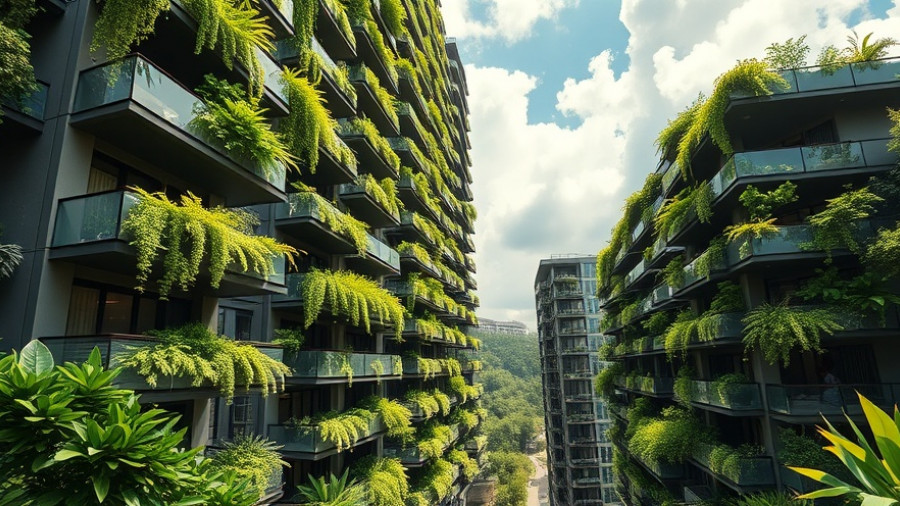
Rethinking Travel: Embrace Sustainable Accommodations
In a rapidly changing world, the hospitality industry is stepping up to the challenge of sustainability. As more travellers embrace eco-friendly lifestyles, the demand for sustainable accommodation has surged. By making small yet impactful changes, hotels and accommodations can not only minimize their environmental footprint but also enhance guest experiences, boost profitability, and stand out in the competitive landscape.
Understanding Hotel Sustainability
At its core, hotel sustainability reflects a holistic approach that aligns environmental responsibility with economic viability. Hotels are public-facing entities; thus, how they manage energy, waste, and water significantly impacts both the environment and their operational costs. According to a study by Just Capital, companies that prioritize sustainable practices outperform their peers, showcasing that green initiatives can substantially improve a brand’s image and bottom line.
Smart Energy Choices Can Transform Operations
Energy use stands as one of the largest contributors to a hotel’s carbon footprint. Transitioning to low-carbon systems is essential. Properties can benefit from:
- Electric Transition: Convert gas-powered appliances to all-electric systems. Not only do electric stoves and heat pumps enhance cooking efficiency, but they also eliminate reliance on fossil fuels.
- Solar Power: Investing in solar panels is one of the most effective ways to generate renewable energy on-site. The added capability of battery storage ensures energy availability even during night hours.
Making these investments not only contributes to the environment but leads to operational savings over time. For instance, hotels incorporating solar water heaters can cut down on energy costs significantly, providing a quick return on investment.
Water Conservation: Every Drop Counts
Water scarcity is a pressing global concern, particularly in hospitality where water consumption is high. To mitigate this, hotels can:
- Implement Rainwater Harvesting: Systems designed to capture and reuse rainwater can provide resources for landscaping and non-potable uses.
- Install Efficient Fixtures: Updating to high-efficiency taps, showers, and toilets can reduce water usage by up to 50%, while maintaining guest comfort.
Providing filtered tap water instead of bottled varieties reduces single-use plastic waste and aligns with eco-conscious guest expectations.
Leading the Way in Waste Management
Effective waste management draws a clear line to hotel sustainability. Moving towards circular systems involves:
- Composting Initiatives: Operational waste, particularly organic matter, can be composted to create valuable soil supplements, thus minimizing landfill contributions.
- Reducing Single-Use Plastics: Hotels can spearhead change by offering biodegradable alternatives which align with responsible tourism practices.
As the hospitality industry begins to embrace sustainability, it is evident that implementing these strategies not only aids the environment but enhances guest experiences, with many consumers preferring brands that exhibit social responsibility.
Real-World Examples of Sustainable Practices
Inspiration can be derived from industry leaders who have integrated sustainable practices into their operations:
- Meliá Hotels International: A leader in sustainability, this chain uses blockchain technology to offset its carbon footprint, showcasing innovation along with ecological responsibility.
- 1 Hotels: This chain emphasizes a commitment to local sourcing and eco-friendly design—showing that luxury and sustainability can coexist.
- Hotel Hermitage Monte Carlo: Achieving sustainability through technologies such as automated lighting and greywater recycling systems, this hotel demonstrates that upscale accommodations can also be eco-friendly.
Each instance significantly impacts energy, water usage, and waste management, setting benchmarks for the industry.
Future Trends and Outcomes
The future trajectory for hotels adopting sustainability is promising. With 83% of travellers believing sustainable travel is critical, properties need to adopt practices that align with this growing demand.
Therefore, hotels should expect not just an increase in bookings but a surge of guest loyalty as environmentally-conscious visitors prefer brands resonating with their values. As our understanding of climate change deepens, so too will the obligation for hotels to adapt and respond to the needs of eco-conscious travellers.
Your Call to Action: Transform Your Travels
If you're seeking to make a positive impact while travelling, consider choosing accommodations that prioritize sustainability. Your choice not only supports these initiatives but also reinforces the importance of eco-conscious living in the hospitality industry. Together, we can forge a greener future, empowering the travel sector to promote environmental stewardship.
 Add Row
Add Row  Add
Add 




Write A Comment